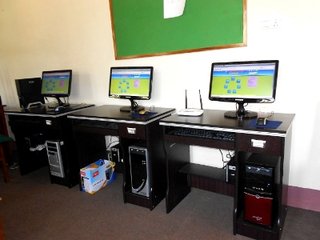
E-Pustakalaya Installation at Moti Community Library, Phalebas, Parbat
April 11, 2012 Program Updates OLE Nepal
OLE Nepal’s team met Mr. Bhola Nath Sharma during a visit to install E-Pustakalaya at Moti Community Library in Phalebas, Parbat district, and was immediately impressed by his dedication to uplifting his community. The people of Phalebas have great respect for Mr. Sharma and his contributions to community development. Moti Community Library, Radio Parbat, Helping Hands Health Clinic, and Bhawani Bidyapith H.S. School are some of the institutions he currently heads. Even in his seventies, he continues to work tirelessly on community development. During our two-day stay in Phalebas, we found him engaged in meetings and events throughout the day, often advising villagers on ways to make Moti Community Library self-sustainable.
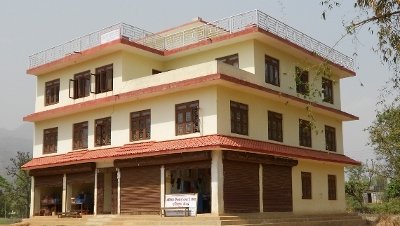
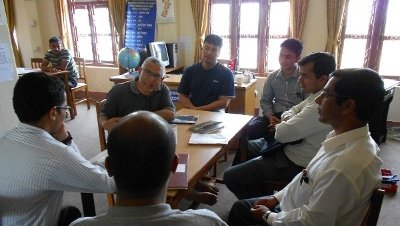
This time, Bhola Jee has initiated the establishment of a digital library within the Moti Community Library Building. The Nepal Library Foundation provided the server, desktop computers, and network equipment, while OLE Nepal installed the E-Pustakalaya (digital library system), which includes thousands of books, educational videos, learning software, and reference materials such as Wikipedia and a dictionary. OLE Nepal’s technical team, Mr. Ram Singh and Mr. Basanta Shrestha, installed the digital library and conducted an orientation for local teachers and users.
The team reached Phalebas after a ten-hour bus ride from Kathmandu. Moti Community Library is housed in a three-story, well-furnished building located just a few meters from a small village house that once served as the old Moti Community Library. Radio Parbat, the Health Clinic, and Bhawani Bidyapith School are all within 150 meters of the Library. To help cover operational costs, the Library rents out a few rooms for commercial purposes. It also has a Bal Bikas Room for early childhood development, stocked with toys and books, reminiscent of expensive Montessori-based schools in Kathmandu. Books and materials in the library and Bal Bikas Room were contributed by Read Nepal and Room to Read.
The Library does not have a lot of books. But it is big, spacious and very well organized. The team installed the E-Pustakalaya server in the adjoining smaller office room. But before installing the software in the newly purchased computers, the team had to assemble tables that were still in the boxes that were shipped from Kathmandu. Assembling table was something the team was not prepared for, and it took quite a bit of effort, but we had fun doing it.
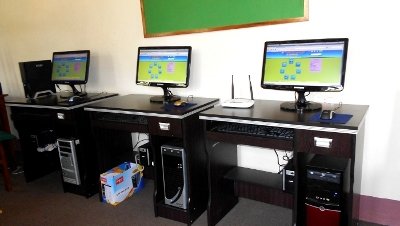
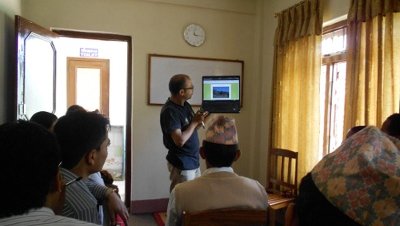
After completing the installation of the digital library, the team conducted an orientation program to local people. Nearly 20 people gathered in the E-Pustakalaya room for the event. Participants included librarians, school teachers and students. One distinguished participant was a famous village boy with a voracious reading habit who was known for reading 610 books from the Library in one month. The orientation briefed about the E-Pustakalaya System, followed by detailed demonstration of several sections of E-Pustakalaya. Participants were also given brief introduction of Ubuntu/Linux System and its basic operation. E-Pustakalaya server and all the workstations were installed with Linux System. Linux System are free, stable and very less prone to computer viruses.
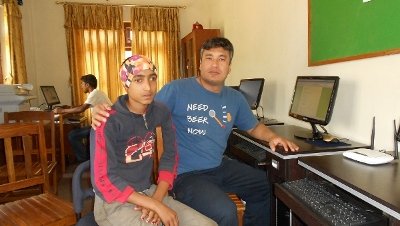
One of the teachers from a nearby village got really impressed by variety of contents of E-Pustakalaya and asked how much would it cost if he wanted to do the whole setup at his school. Later, Bhola Jee pointed out the benifits of digital library to the participants. He further asked us to share the success stories of digital library in other program districts. We then gave example of Pancha School in Kapilvastu about how they are taking maximum benefit of E-Pustakalaya not only to educate students but also to promote literacy amongst mothers of the children and the whole community.